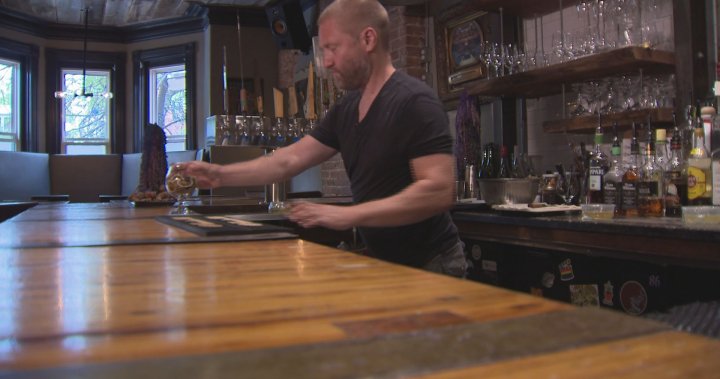Running a business can mean long days and tight margins, and while pandemic recovery continues, the repayment of loans racked up during the global emergency is adding to those regular stresses.
Downtown Ottawa restaurant Union Local 613 owner Ivan Gedz is no stranger to that feeling.
He is banking on Ottawa Pride at the end of August to try and help get his books in the black.
He says normally, he wouldn’t be relying on a single event, but with money tight, it’s bringing on tough buying decisions.
“Right now, I’m, you know, ordering a case of wine or a couple of kegs of beer. I have to make these very delicate decisions just to maintain cash flow,” Gedz said.
Like many businesses, Gedz says Union Local 613 is not even remotely close to recovered from the COVID-19 pandemic, estimating overall revenue is down about 25 to 30 per cent.
The bar is one of the nearly 900,000 businesses that took out Canadian Emergency Business Account (CEBA) loans. Initially, the interest-free loans capped out at $40,000, but as the pandemic dragged on and public health restrictions remained in place, a $20,000 extension was offered.
If businesses are able to pay back up to $40,000 of the loan by Dec. 31, $20,000 will be forgiven. If not, the business is on the hook to pay it back over the next two years with a five per cent interest rate.
In the current business climate, Gedz says that isn’t in the cards right now.
“I’ve also injected substantial funds into the business since then. And just as a caveat, not that I necessarily deserve it or whatnot, but I haven’t paid myself prior the five months at this point,” he said.

He added that the rising cost of doing business isn’t helping the recovery, pointing to increased costs coming from suppliers.
Gedz isn’t alone in this. The Canadian Federation of Independent Business (CFIB) polled its membership earlier this year about their ability to pay back CEBA loans by deadline.
Of the 98,000 CFIB members, 43 per cent say they will not be in a position to repay the debt by that year-end deadline. Forty-seven per cent say they will be able to pay, but it will be a significant struggle for half.
This prompted the CFIB to write to the government, asking for a one-to-two-year extension on that deadline.
“We’re not saying forgive the debt. We’re not going that far. We’re telling them, just give business owners, small business owners more time,” CFIB national affairs director Christina Santini said.
If you go onto the webpage for CEBA, the terms are clear – repayment dates are final and coming up soon. The government states it already offered a one-year extension on repayment.
In total, $49.2 billion in CEBA loans were doled out through the program.

That prior extension is cold comfort to Ottawa-based Orangetheory Fitness franchisee Marc Langelier. He opened his location in late 2020, and says he has no concrete plan on how to pay back his loan.
“Well, currently we’re just making ends meet. That’s not considering CEBA payments or interest on loans,” Langelier said.
“So, it would push us into the red for sure. So now I think we would still give it a shot for the next six to 12 months.”
While inflation is showing signs of cooling, food prices remain high. This has Gedz keeping Union Local 613 open for at least a few more months, but it’s not looking good.
“I’m probably going to try and push through till the spring. But the amount that I’m leveraging my personal home in order to do that and so on and so forth, is there’s some dark nights, grumpy early mornings associated with that. I won’t lie,” he said.
— with files from Global News’ Touria Izri
© 2023 Global News, a division of Corus Entertainment Inc.




